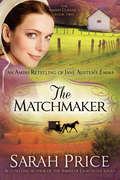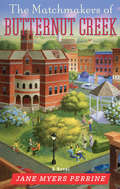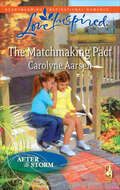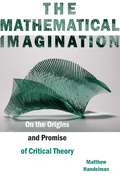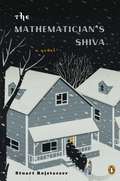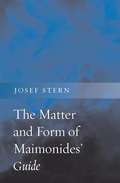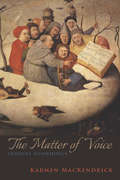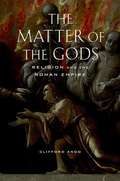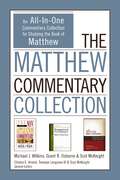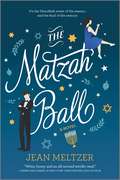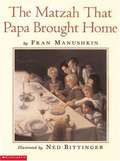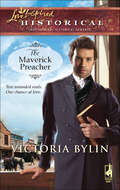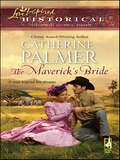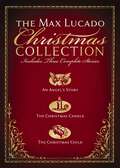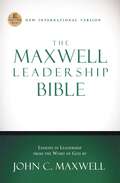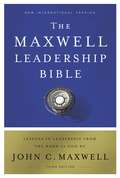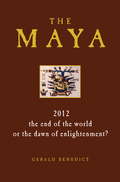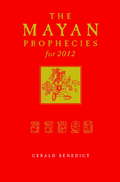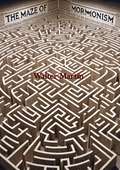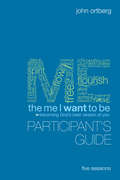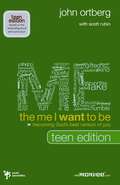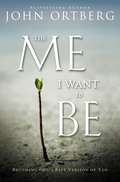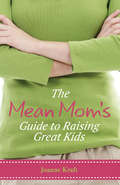- Table View
- List View
The Matchmaker: An Amish Retelling of Jane Austen's Emma (The Amish Classics #2)
by Sarah PriceWhen Emma&’s interference in her friends&’lives backfires, will the consequencesbe more than she bargained for?Emma Weaver is twenty-one years old and has found a passion for playingmatchmaker with her friends. Her neighbor, Gideon King, warns her aboutinterfering in people&’s lives, but she disregards his advice and plans to set upPaul, the son of the bishop, with her friend Hannah. But when Paul misinterprets Emma&’s attention, believing she has feelingsfor him, he begins asking her to ride in his buggy after Sunday singings andshows up at her house for Friday evening visits. As she tries to repair thedamage that&’s been done and mend the hearts that have been broken, shefinds herself in trouble with the community. Will she learn her lesson andstop meddling in the affairs of others? Will she find a love of her own?
The Matchmakers of Butternut Creek: A Novel (Butternut Creek #2)
by Jane Myers PerrineOnce again, the Widows of Butternut Creek are determined to find a bride for Pastor Adam. This time, their candidate is as gun shy as the pastor! A traumatic experience as a college freshman has left Gussie Milton 'once bitten, twice shy.' Although she'd like a relationship, she's frightened, so she's thrown herself into caring for her aging parents, her photography business, and her church. In the eyes of Miss Birdie and her friend Mercedes, aka 'the Widows,' Gussie would make their young pastor the perfect wife. And though the attraction proves mutual, first Gussie's past and then the pastor's hopes for the future threaten to keep them apart. Can the Widows' meddling be the catalyst that changes the couple's lives forever?
The Matchmaking Pact (After the Storm #5)
by Carolyne AarsenLily Marstow and Alyssa Cane think they have the perfect plan. After all, helping their single parents fall in love shouldn't be that hard. But Silas Marstow wants nothing to do with the woman who lost track of his child for precious minutes in the aftermath of the High Plains tornado. And Josie Cane is busy caring for her ailing grandmother and rebuilding her life. The girls' matchmaking pact is in jeopardy unless they can make their parents see the love that's right in in front of them.
The Material Culture of the Jacobites
by Neil GuthrieThe Jacobites, adherents of the exiled King James II of England and VII of Scotland and his descendants, continue to command attention long after the end of realistic Jacobite hopes down to the present. Extraordinarily, the promotion of the Jacobite cause and adherence to it were recorded in a rich and highly miscellaneous store of objects, including medals, portraits, pin-cushions, glassware and dice-boxes. Interdisciplinary and highly illustrated, this book combines legal and art history to survey the extensive material culture associated with Jacobites and Jacobitism. Neil Guthrie considers the attractions and the risks of making, distributing and possessing things of danger; their imagery and inscriptions; and their place in a variety of contexts in the seventeenth and eighteenth centuries. Finally, he explores the many complex reasons underlying the long-lasting fascination with the Jacobites.
The Mathematical Imagination: On the Origins and Promise of Critical Theory
by Matthew HandelmanThis book offers an archeology of the undeveloped potential of mathematics for critical theory. As Max Horkheimer and Theodor W. Adorno first conceived of the critical project in the 1930s, critical theory steadfastly opposed the mathematization of thought. Mathematics flattened thought into a dangerous positivism that led reason to the barbarism of World War II. The Mathematical Imagination challenges this narrative, showing how for other German-Jewish thinkers, such as Gershom Scholem, Franz Rosenzweig, and Siegfried Kracauer, mathematics offered metaphors to negotiate the crises of modernity during the Weimar Republic. Influential theories of poetry, messianism, and cultural critique, Handelman shows, borrowed from the philosophy of mathematics, infinitesimal calculus, and geometry in order to refashion cultural and aesthetic discourse.Drawn to the austerity and muteness of mathematics, these friends and forerunners of the Frankfurt School found in mathematical approaches to negativity strategies to capture the marginalized experiences and perspectives of Jews in Germany. Their vocabulary, in which theory could be both mathematical and critical, is missing from the intellectual history of critical theory, whether in the work of second generation critical theorists such as Jürgen Habermas or in contemporary critiques of technology. The Mathematical Imagination shows how Scholem, Rosenzweig, and Kracauer’s engagement with mathematics uncovers a more capacious vision of the critical project, one with tools that can help us intervene in our digital and increasingly mathematical present.
The Mathematician's Shiva: A Novel
by Stuart Rojstaczer"A brilliant and compelling family saga full of warmth, pathos, history, and humor." -Jonathan Evison, author of West of Here "A hugely entertaining debut." -Publishers Weekly When the greatest female mathematician in history passes away, her son, Alexander "Sasha" Karnokovitch, just wants to mourn his mother in peace. But rumor has it the notoriously eccentric Polish émigré has solved one of the most difficult problems in all of mathematics, and has spitefully taken the solution to her grave. As a ragtag group of mathematicians from around the world descends upon Rachela's shiva, determined to find the proof or solve it for themselves--even if it means prying up the floorboards for notes or desperately scrutinizing the mutterings of her African Grey parrot--Sasha must come to terms with his mother's outsized influence on his life. Spanning decades and continents, from a crowded living room in Madison, Wisconsin, to the windswept beach on the Barents Sea where a young Rachela had her first mathematical breakthrough, The Mathematician's Shiva is an unexpectedly moving and uproariously funny novel that captures humanity's drive not just to survive, but to achieve the impossible.
The Matter and Form of Maimonides' Guide
by Josef SternMaimonides’ Guide of the Perplexed is generally read as an attempt either to harmonize reason and revelation or to show that they are irreconcilable. Moving beyond these familiar debates, Josef Stern argues that the perplexity addressed in this famously enigmatic work is the tension between human matter and form: the body and intellect.
The Matter of Voice: Sensual Soundings
by Karmen MacKendrickPhilosophers for millennia have tried to silence the physical musicality of voice in favor of the purity of ideas without matter, souls without bodies. Nevertheless, voices resonate among bodies, among texts, and across denotation and sound; they are singular, as unique as fingerprints, but irreducibly collective too. They are material, somatic, and musical. But voices are also meaningful—they give body to concepts that cannot exist in abstractions, essential to sense yet in excess of it. They can be neither reduced to neurology nor silenced in abstraction. They complicate the logos of the beginning and emphasize the enfleshing of all words. Through explorations of theology and philosophy, pedagogy, translation, and semiotics, all interwoven with song, The Matter of Voice works toward reintegrating our thinking about both speaking and authorial voice as fleshy combinings of meaning and music.
The Matter of the Gods: Religion and the Roman Empire
by Clifford AndoIn a peculiar, limited, but important sense, the history of Christianity is the history of doctrine. For that reason, Christians could disdain to acknowledge massive historical events like the sack of Rome in 410 C. E. Adherents of Roman religion in late antiquity could not, and in the face of disaster on that scale, their faith--their faith in their knowledge--did not so much bend, but break.
The Matthew Commentary Collection: An All-In-One Commentary Collection for Studying the Book of Matthew
by Tremper Longman III Scot Mcknight Michael J. Wilkins Clinton E. Arnold Grant R. OsborneThis all-in-one commentary bundle on the book of Matthew features volumes from the NIV Application Commentary Series, Zondervan Exegetical Commentary Series, and Story of God Bible Commentary Series. Each volume provides new and unique insights from leading biblical scholars Michael Wilkins, Grant Osborne, and Scot McKnight. The unique features from each volume along with the diverse insights provided by the authors gives you all the tools you need to study and master the book of Matthew.
The Matzah Ball: A Novel
by Jean MeltzerA MOST ANTICIPATED BOOK SELECTED BY * POPSUGAR * BUSTLE * BUZZFEED * BOOKPAGE * GOODREADS MEMBERS"The Matzah Ball had me laughing out loud...an all-around terrific read."—Debbie Macomber, #1 New York Times bestselling authorOy! to the worldRachel Rubenstein-Goldblatt is a nice Jewish girl with a shameful secret: she loves Christmas. For a decade she&’s hidden her career as a Christmas romance novelist from her family. Her talent has made her a bestseller even as her chronic illness has always kept the kind of love she writes about out of reach.But when her diversity-conscious publisher insists she write a Hanukkah romance, her well of inspiration suddenly runs dry. Hanukkah&’s not magical. It&’s not merry. It&’s not Christmas. Desperate not to lose her contract, Rachel&’s determined to find her muse at the Matzah Ball, a Jewish music celebration on the last night of Hanukkah, even if it means working with her summer camp archenemy—Jacob Greenberg.Though Rachel and Jacob haven&’t seen each other since they were kids, their grudge still glows brighter than a menorah. But as they spend more time together, Rachel finds herself drawn to Hanukkah—and Jacob—in a way she never expected. Maybe this holiday of lights will be the spark she needed to set her heart ablaze. "A luminous celebration of all types of love, threaded with the message that everyone is worthy of it.&”—Rachel Lynn Solomon, author of The Ex Talk
The Matzah That Papa Brought Home
by Fran ManushkinIn exuberant verse and breathtaking paintings, the age-old traditions of Passover come vividly to life. This rhythmic tale conveys all the warmth and richness of this cherished holiday and the family traditions that surround it.
The Maverick Preacher
by Victoria BylinA minister seeking forgiveness for past wrongs heads to the western frontier and finds love with a single mother in this inspirational historical romance.Once upon a time, he was one of Boston's most righteous ministers. Now Joshua Blue is a guilt-stricken man scouring the West to find the sister he drove away with his pride. When the trail leads him to Denver, a beautiful boardinghouse owner might be the key to unlocking past secrets .By sheer determination, Adelaide Clark has raised her young son alone. When Joshua arrives at her door, Adie fears he'll tear her family apart. As she gets to know the charming preacher, however, she sees he's come to make amends for past wrongs. Soon his strong faith sparks Adie's long-buried hope for a future with a God-sent partner at her side
The Maverick's Bride
by Catherine PalmerHer faith takes her across the world and into the path of a most extraordinary man. Freshly arrived in East Africa, Emma Pickering is instantly drawn to Adam King. The rugged cowboy is as compelling as he is mysterious. And if he'll agree to a marriage of convenience, it would solve both their problems. Emma could secure her inheritance—and with it, her chance to find her sister. Adam could gain the funds needed to carve his ranch out of the savanna. Yet their match is anything but "convenient" when Emma's fears gain hold, and malicious whispers threaten to tear the couple apart. Only their love and shared faith can save their life together.
The Max Lucado Christmas Collection
by Max LucadoIn the mystery of Christmas we find its majesty. The mystery of how God became flesh, why he chose to come, and how he must love his people. Such mysteries can never be solved, just as Love can never be diagrammed. Christmas is best pondered, not with logic, but with imagination.
The Maxwell Leadership Bible, NIV: Holy Bible, New International Version
by John C. MaxwellThe Leadership expert, John Maxwell, provides an in-depth look at God's laws for leaders and leadership, directly connected to the Bible. Now for the first time, the content of The Maxwell Leadership Bible is paired with the bestselling New International Version.Features include:Complete NIV Bible text and translators' notesBook introductionsArticles describing the 21 Laws of Leadership and the 21 Qualities of a LeaderNotes throughout the Bible that connect with the Laws and QualitiesIndexes to the 21 Laws of Leadership and the 21 Qualities of a LeaderPart of the Signature Series line of Thomas Nelson BiblesMaxwell Leadership Bibles sold to date: More than 675,000
The Maxwell Leadership Bible: New International Version
by Thomas NelsonEvery believer is a person of influence. In the Maxwell Leadership Bible, leadership expert John C. Maxwell shows you the principles of leadership taught in God’s Word and how to use them. Whether you are an employee, a boss, a parent, or a neighbor, you are a person of influence in your part of the world. Throughout the pages of Scripture, John Maxwell has assembled the time-tested and irrefutable biblical principles of leadership to equip and encourage leaders with his signature approach, including the 21 Laws of Leadership, the 21 Qualities of a Leader, biographical profiles, and hundreds of notes.Features include:Now available in the NIV Comfort Print® typefaceOver 120 “Profiles in Leadership” lessons drawn from the people of the BibleHundreds of compelling short articles and notes on mentoring and influenceA complete reference index to the 21 Laws of Leadership and the 21 Qualities of a LeaderClear and readable 10-point print size
The Maya
by Gerald BenedictGerald Benedict uncovers the real meaning behind the Mayan Prophecies for 2012, and rather than being a disastrous cataclysmic change he reveals that it is the dawn of a new age - an evolutionary development away from materialism and cynicism towards a more spiritual and ethical stance, and a true understanding of our place in the universe
The Mayan Prophecies for 2012
by Gerald BenedictA cataclysmic change to our way of life is looming as the winter solstice of 2012 heralds the end of the 5,000-year Mayan "Fourth Age". With its conclusion, will we see the end of the world as we know it, or the dawning of a new golden age?
The Maze of Mormonism
by Walter MartinNavigate the intricate beliefs and practices of the Church of Jesus Christ of Latter-day Saints with Walter Martin’s The Maze of Mormonism. This critical examination provides a thorough analysis of Mormon doctrine, history, and theology, offering readers an insightful exploration of one of the fastest-growing religious movements in the world.Walter Martin, a renowned Christian apologist and expert on cults and new religious movements, meticulously unpacks the foundational teachings of Mormonism, comparing them with traditional Christian doctrines. Through detailed research and careful scrutiny, Martin addresses key aspects of Mormon belief, including the nature of God, the role of Jesus Christ, the authority of the Book of Mormon, and the church’s view on salvation and the afterlife.The Maze of Mormonism delves into the origins of the LDS Church, examining the life and claims of its founder, Joseph Smith, and the subsequent development of Mormon theology under leaders such as Brigham Young. Martin provides historical context and critical perspectives on the church’s unique scriptures and revelations, offering readers a comprehensive understanding of how Mormon beliefs have evolved over time.In addition to theological critique, Martin explores the sociological and cultural dimensions of Mormonism, highlighting the church’s practices, missionary efforts, and community life. He presents testimonies and experiences of former Mormons, shedding light on the challenges and controversies surrounding the church.This book is an essential resource for Christians seeking to understand Mormonism from an orthodox perspective, as well as for anyone interested in the complexities of religious belief and practice. Martin’s clear and accessible writing style makes The Maze of Mormonism a valuable tool for pastors, theologians, and laypeople alike, providing the information needed to engage thoughtfully and respectfully with members of the LDS Church.
The Me I Want to Be Participant's Guide: Becoming God's Best Version of You
by John Ortberg Scott RubinIf God has a perfect vision for your life, why does spiritual growth seem so difficult? Pastor and bestselling author John Ortberg has some intriguing answers to that question, and he has organized his thoughts and God's words into a straightforward and timely guide for living your best life in The Me I Want to Be. In this study you will learn how God's perfect vision for you starts with a powerful promise. All those who trust in God "will be like a tree planted by the water that sends out its roots by the stream. It does not fear when heat comes; its leaves are always green. It has no worries in a year of drought and never fails to bear fruit" (Jeremiah 17:7-8). Ortberg urges you to recognize your brokenness, understand that God is the project manager, and follow His directions. He also helps gauge your spiritual health and measure the gap between where you are now and where God intends you to be. The Me I Want To Be Participant’s Guide is a guidebook to the great task and joy of your life … becoming God’s best version of you. Designed for use with the video.
The Me I Want to Be, Teen Edition: Becoming God's Best Version of You
by John Ortberg Scott RubinThe Me I Want to Be by John Ortberg—the bestselling author of When the Game Is Over, It All Goes Back in the Box; God Is Closer Than You Think; and The Life You’ve Always Wanted—will help you discover spiritual vitality like never before as you learn to “live in the flow of the spirit.” But if God has a perfect vision for your life, why does spiritual growth seem so difficult? John Ortberg has some intriguing answers to that question, and he has organized his thoughts and God's words into a straightforward and timely guide for living your best life in The Me I Want to Be. This book will show how God's perfect vision for you starts with a powerful promise. All those who trust in God "will be like a tree planted by the water that sends out its roots by the stream. It does not fear when heat comes; its leaves are always green. It has no worries in a year of drought and never fails to bear fruit" (Jeremiah 17:7-8). Ortberg urges you to recognize your brokenness, understand that God is the project manager, and follow His directions. The author first helps gauge your spiritual health and measure the gap between where you are now and where God intends you to be. Then he provides detailed tasks and exercises to help you live in the flow of the Spirit, circumventing real-world barriers—pain and sorrow, temptations, self-doubt, sin—to flourish even in a dark and broken world. As you start living in the flow, you will feel: — a deeper connection with God — a growing sense of joy — an honest recognition of your brokenness — less fear, more trust — a growing sense of being “rooted in love” — a deeper sense of purpose God invites you to join Him in crafting an abundant and joy-filled life. The Me I Want to Be shows you how to graciously accept His invitation.
The Me I Want to Be: Becoming God's Best Version of You
by John OrtbergThe Me I Want to Be by John Ortberg—the bestselling author of When the Game Is Over, It All Goes Back in the Box; God Is Closer Than You Think; and The Life You’ve Always Wanted—will help you discover spiritual vitality like never before as you learn to “live in the flow of the spirit.” But if God has a perfect vision for your life, why does spiritual growth seem so difficult? John Ortberg has some intriguing answers to that question, and he has organized his thoughts and God's words into a straightforward and timely guide for living your best life in The Me I Want to Be. This book will show how God's perfect vision for you starts with a powerful promise. All those who trust in God "will be like a tree planted by the water that sends out its roots by the stream. It does not fear when heat comes; its leaves are always green. It has no worries in a year of drought and never fails to bear fruit" (Jeremiah 17:7-8). Ortberg urges you to recognize your brokenness, understand that God is the project manager, and follow His directions. The author first helps gauge your spiritual health and measure the gap between where you are now and where God intends you to be. Then he provides detailed tasks and exercises to help you live in the flow of the Spirit, circumventing real-world barriers—pain and sorrow, temptations, self-doubt, sin—to flourish even in a dark and broken world. As you start living in the flow, you will feel: — a deeper connection with God — a growing sense of joy — an honest recognition of your brokenness — less fear, more trust — a growing sense of being “rooted in love” — a deeper sense of purpose God invites you to join Him in crafting an abundant and joy-filled life. The Me I Want to Be shows you how to graciously accept His invitation.
The Mean Mom's Guide to Raising Great Kids
by Joanne Kraft"Mom, you're so mean!" Do you struggle to instill loving boundaries and become discouraged when your child doesn't like you for them? Let The Mean Mom's Guide inspire you to dig in and stand your ground when parenting gets tough-because a mean mom isn't always the mean you think it means.The Mean Mom's Guide to Raising Great Kids encourages overly nice "marshmallow" moms to instill a few much-needed boundaries. It motivates parents to stand their ground when childrearing is tough, most especially when a child doesn't like them for it.Covering parenting from preschool to high school, each of the four sections highlights topics specific to each age. Scripture is weaved throughout as a continual reminder of God's truth, and "Mom 2 Mom" quotes at the end of each chapter are filled with heartfelt transparency from dozens of moms who lent their own experiences to encourage the reader. Mean moms encourage openly, love passionately, and know full well being called mean by her child is oftentimes a compliment.
The Meanest Teacher (Darcy and Friends, #3)
by Joni Eareckson Tada Steve Jensenfrom the book jacket twelve year old Darcy, trying to project a 'normal' image in junior high despite her wheelchair, runs for ofice with the promise of exposing cruel and unfair teachers in the school until prayer and her friends reveal to her that every situation has two sides.
